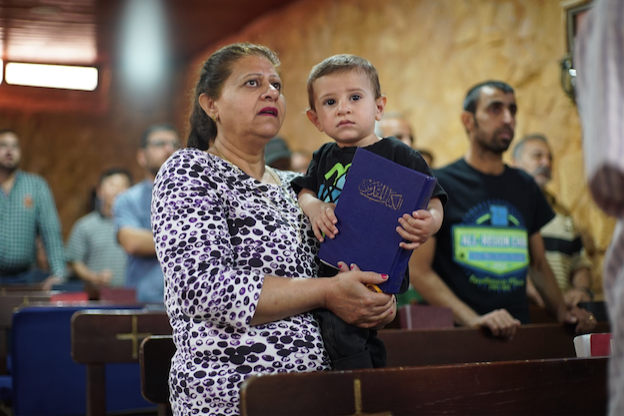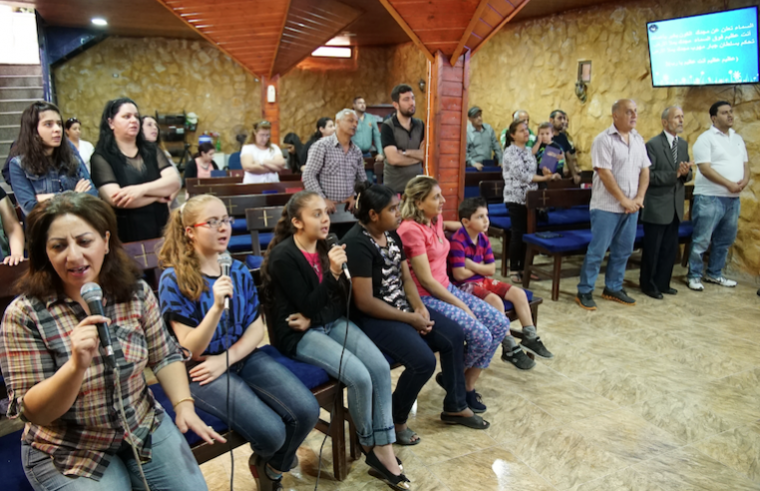This sacrificial ministry in Jordan is sharing Christ with hundreds of refugees
Weary faces fill the pews in the stone-hewn basement church in Jordan. Perhaps that's not surprising as three-quarters of this congregation are refugees, who have fled from neighbouring Iraq.
This one church, in the small town of Ma'in, cares for 100 Iraqi families as well as many local people. Also, outside the services, it provides both practical and pastoral support for some 350 Syrian families.

The extraordinary couple at the heart of this work are Pastor Amjad and his wife Sanaa. Bible Society volunteers, they provide Bible-based trauma counselling for adults and children alike. They also distribute much-needed aid: anything from food to bedding, stoves to nappies, Bibles to electric fans. As much as anything else, they pour out the milk of human kindness. So, it's no wonder that the church is full.
Sanaa is originally from Syria, so, when people started fleeing her homeland, she wanted to help. Now, the couple have been working with refugees on behalf of Bible Society for seven years.
'We were shocked when the war started in Syria,' says Sanaa. 'At this time, during the war, I felt that I should be with my family in Syria. Then I realised that God has brought me to Jordan for this time, for the work in Syria.
'He gave me the feeling of a mother to children coming from Syria. They had been tortured. They were beaten and traumatised. They were scared and had psychological issues. But we thank God, because of his love we could give them love.'
She started to teach the children Arabic, English and Bible stories. 'The children started to change,' she says. 'The parents asked me, "What do you do? The children have changed. They are calmer now." I told the parents, "This is not my work. It is God's work."
'That was a turning point in our lives. The parents started coming to church too. We had real problems with the children. I told their mothers how to calm their children and take care of their health and take care of their psychological problems.

'We thank God for these things that they don't get lost in their lives. It was fruitful in their families and their children and the programme is still continuing. I'm still teaching the kids and telling them more and more about Jesus' love. When they go to another country, I give them a blessing.'
There's evidence of her classes on the wipe board at the front of church. Inside of a list of hymns, it still bears the marks of the lessons she's been delivering in the week.
Students have been learning the plural: 'they watch TV every day' and the negative: 'do not/does not'.
There's a lot of watching 'TV every day' for adult refugees in Jordan. They are forbidden by law from working, though many do try to earn a small income by working illegally.
With little to do, the 'negative' also comes into their lives. So, daily visits from Sanaa, Pastor Amjad and others in the church, are supportive and encouraging.
One of those to benefit is a woman we'll call Miriam. She fled her home in Qaraqosh in Iraq in 2014. Initially, she and her two sons went to Turkey. But, the cost of living drove them back to Iraq. Today, they live just outside Mai'in.
Here, they've been joined by Miriam's abusive husband. She talks of regular beatings, being followed and once, being threatened with a knife.
'At church, often I can't concentrate on God because I am thinking about what he will do when I get back,' she says, 'but having people here praying for me helps.
'When I took part in the trauma healing, I felt that I can breathe again,' she adds. 'I felt relieved. I needed someone to listen to me. I needed people to hear me. I needed to tell someone what had happened to me. They have helped me a lot.'
Back in the church, the refugee congregation spends 40 minutes singing and praying. Then, Pastor Amjad preaches. He doesn't gloss over the difficulties of life.
Preaching from 1 Thessalonians 4:13, he says: 'A lot of people die and there is a lot of violence in this world. ISIS killed so many people in Syria.
'When we hear of deaths we have to be careful and know that we have to pray more and more. The war was terrible for many people, but coming here has been worse for many, so we have to be ready [for Christ].'
Seven years of doing this have taken their toll. Pastor Amjad received a cancer diagnosis 17 years' ago. He works seven days a week.
'My body is so tired,' he says. 'There's so much pressure because of the refugees. I'm thinking that I'd like to retire next year. It's become a burden on my health and my family, but I feel God is encouraging me to do this job.'
And with that, he turns off the church lights, shuts the door and heads off for a funeral.











